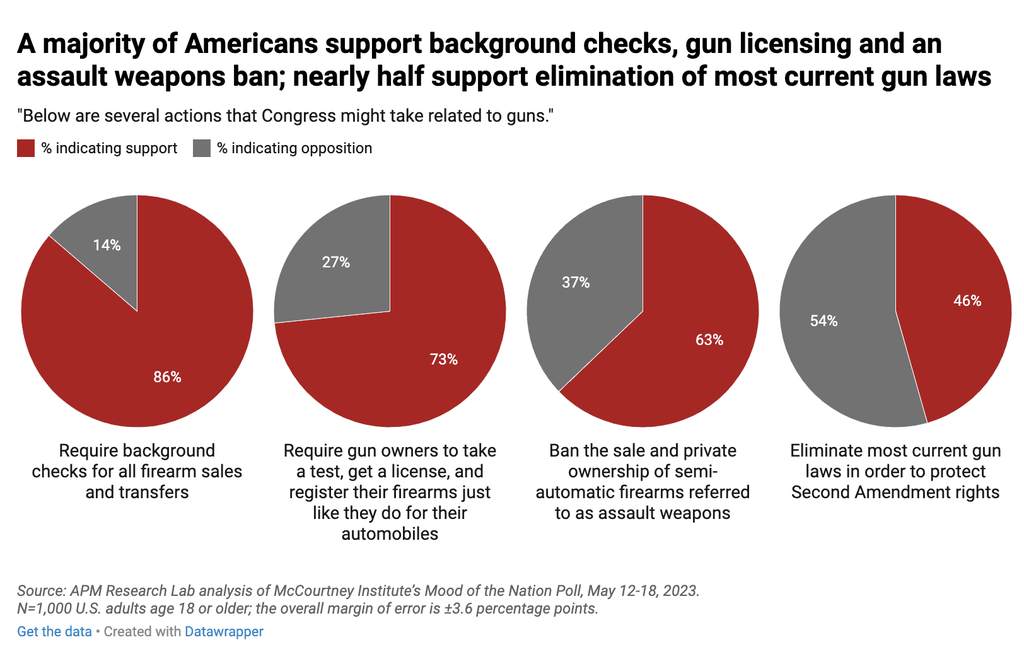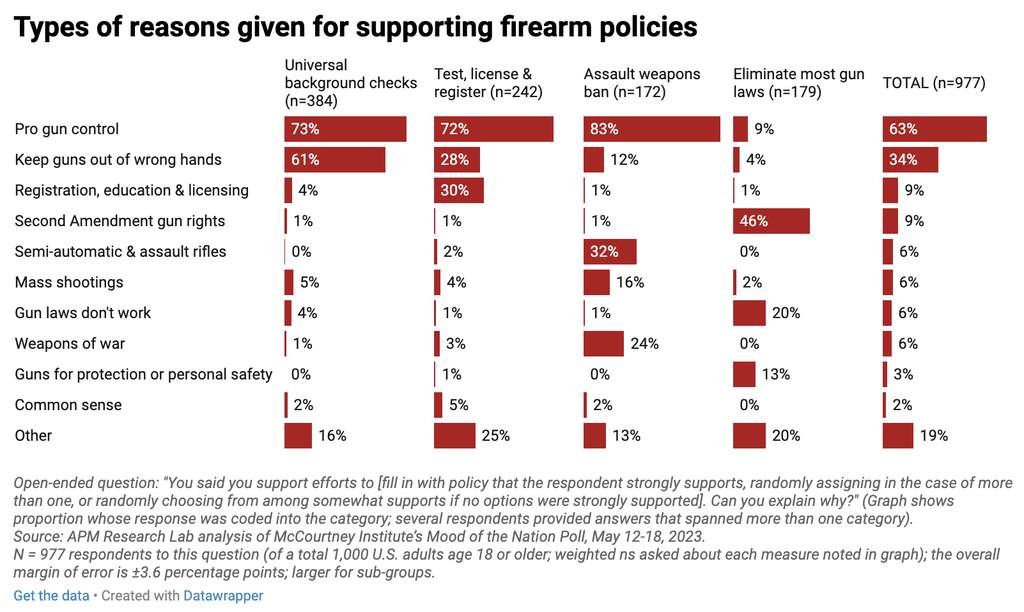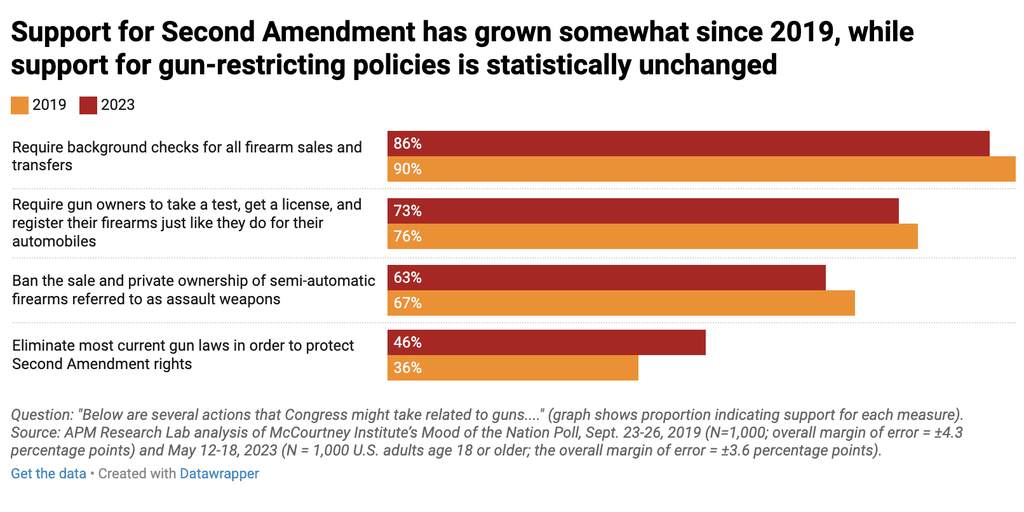After nearly 20 years of covering Second Amendment issues on a daily basis, I’ve long since lost track of how many polls on gun control I’ve had the chance to examine, but I have come to one conclusion: most of them are absolutely worthless when it comes to gauging how Americans really feel about various policies.
Take a new survey from the McCourtney Institute for Democracy, for example. According to the findings of its latest Mood of the Nation Poll, more than 80% of those surveyed said they support “universal” background checks; 73% support requiring gun owners to take a test, obtain a license, and register their firearms with the federal government; and 63% back a ban on “semi-automatic firearms referred to as ‘assault weapons'”. Those numbers will likely be touted by anti-gun activists as examples of the type of “common sense” proposals that have the backing of the vast majority of Americans, but they’ll ignore another finding by the survey that completely contradicts support for those gun control measures; the 46% of respondents who also say they’re in favor of scrapping most of the current gun laws in place “in order to protect Second Amendment rights.”

Getting rid of most gun laws in order to save the Second Amendment directly contradicts things like banning the sale of modern sporting rifles or mandating that would-be gun owners take a test, get licensed, and register their guns with the government, but clearly there’s a sizable portion of the survey’s respondents who see no problem with holding those competing views. In fact, according to the survey, nearly 10% of those who say they’re in favor of scratching most existing gun laws in order to secure our right to keep and bear arms told pollsters that the main reason for their support is because they like gun control.

If this survey tells us anything useful, it’s that there are whole lot of people out there who aren’t thinking too deeply about these issues. The number one reason given for supporting the anti-gun measures referenced by the survey is the “pro-gun control” views of respondents, rather than any supposed specific benefit to the policies themselves. While the same is true when it comes to the reasons for eliminating most current gun laws, those who supported that idea were far more likely to offer specific reasons why, including the 20% who said gun laws aren’t effective and the 13% who say that firearms are important for protection or personal safety.
Like the vast majority of other surveys on attitudes towards gun control, the Mood of the Nation poll also fails to mention or ask what type of consequence there should be for violating the laws that a majority wants to see in place. While a majority of survey respondents say they’re in favor of “universal background checks” or a federal gun license, I suspect that number would fall dramatically if the pollster’s included the not-so-minor detail about violations resulting in a potential federal felony charge or up to ten years in prison. The Crime Prevention Research Center disovered that’s exactly what happened when survey respondents were given more details about “red flag” laws, with support plummeting as poll takers learned about the specifics of Extreme Risk Protection Orders.
The Crime Prevention Research Center hired McLaughlin & Associates to survey Red Flag Laws for 1,000 general election voters from July 21st to 24th, 2022. The survey asked people whether they supported Red Flag Laws, then asked whether they still supported it when they were told that there are no hearings before an individual’s guns are taken away, and there are no mental health care experts involved in the process, and finally, if they prefer Involuntary Commitment or Red Flag laws.
While people initially say they support Red Flag Laws by a two-to-one margin (58%-to-29%), when they were told that there are no hearings before an individual’s guns are taken away and there are no mental health care experts involved in the process support changes to opposition (30%-to-47%). The biggest change is among those who most strongly support or oppose Red Flag Laws, with strong support plummeting from 34% to 14% and strong opposition rising from 18% to 29%. When then asked if they support Involuntary Commitment or Red Flag Laws, people support Involuntary Commitment by a 40%-to-33% margin.
Majority support turned into majority opposition once the devil in the details were explained to the survey respondents, and yet I’ve seen no other polling since the CPRC’s survey last year that attempts to educate respondents to the particulars of a federal “assault weapons” ban or gun licensing law when determining support.
Even without informing the 1,000 adults who took part in the Mood of the Nation poll about how these proposed laws would be enforced, the survey found a slight decline in their popularity compared to four years ago, while there’s been a noticeable increase among those who say most of our current laws should be repealed.

Imagine what those numbers would look like if the survey respondents had been properly educated on the intricacies of these gun control proposals, like the delays of a year or more that can happen when localities are allowed broad discretion in issuing carry permits or gun licenses, or the disproportionate harm done to racial minorities and those living in high-crime communities by imposing a laundry list of government regulations on the exercise of a fundamental civil right. Do you think we’d still see 86% support for “universal background checks” or gun licensing laws? I certainly don’t, but I hope that the Mood of the Nation poll will try to prove me wrong by engaging in the kind of detailed explanations that the Crime Prevention Research Center and McLaughlin and Associations provided respondents to their survey on “red flag” laws going forward. According to the group’s own mission statement, the goal of the Institute for Democracy is to “foster a model of deliberation, policymaking, and responsiveness that is at once passionate, informed, and civil”; something that’s awfully hard to do when so many respondents to their poll are clueless about how these policies work in practice.








